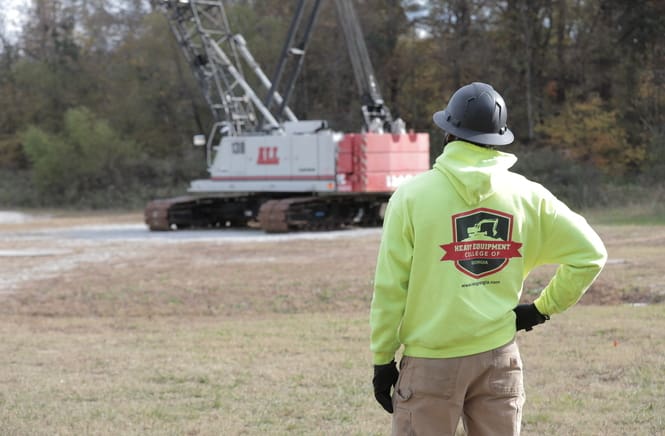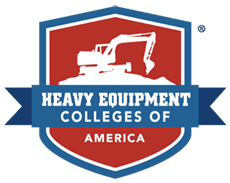Table of Contents
Whether you are a heavy equipment novice or an experienced operator looking to advance your career, completing a heavy equipment training program offers a number of important professional benefits.
Here’s a look at five of the biggest:
Top 5 Benefits of Heavy Equipment Training
1. Professional Certification:
Most heavy equipment operator schools offer education and training programs that qualify their graduates to earn certification from one of more nationally-recognized professional associations. Not all states, however, require heavy equipment operators to be licensed or certified. And in those states that do, not all types of equipment require licensing or certification to operate. So why is professional certification so important?
- Some states do not require heavy equipment operator licensing and/or certification
As mentioned, not all states require licensing or certification to operate heavy equipment, but some do. And while specific requirements vary from jurisdiction to jurisdiction, most states accept professional association certification as either a required step in the licensing process, or in and of itself, sufficient to operate certain heavy equipment within in borders.Examples of professional certifications include:- Adaptable Equipment Proficiency Testing (ADEPT): ADEPT is a nationally-recognized certification for operators of a number of heavy equipment types. ADET is sponsored by the National Association of Heavy Equipment Training Services (NAHETS).
- National Commission for the Certification of Crain Operators (NCCCO): The NCCO is the most respected professional organization for cane operation in the United States, and its CCO certification is highly recognized by state and city regulatory agencies throughout the nation.
Quality heavy equipment operator colleges and training programs qualify their graduates to sit for the certification exams for either or both ADEPT and NCCCO certifications.
- New OSHA certification requirements are coming.The occupational safety and health administration (OSHA) has passed a number of regulatory standards requiring certification for crane operators nationwide that are set to become effective in November 2017. Professional organizations like the NCCCO have already adapted their CCO certification programs to meet these new OSHA standards. Most crane operator programs offered by heavy equipment schools prepare their students to sit for COO certification that will satisfy OSHA requirements.
2. Employability:
Simply put, employers like to hire operators with both a depth and breadth of knowledge and experience. And while you’ll have to gain most of your experience on the job, heavy equipment schools are a great way for rookies to get a little operating experience under their belts, and for all students to expand their knowledge on a wide range of important work-related subjects.

Here are just a few examples of the topics in typical heavy equipment training courses:
- Basic Rigging
- Blueprints
- Construction Math
- Construction Site Tools and Equipment
- Slopes and Grading
- Soils
In addition, heavy equipment operator schools offer training in a variety of equipment types, thus allowing students the opportunity to expand their flexibility and expertise on the job site, something employers find very attractive. Examples of the equipment students may learn to operate include:
- Articulated Haulers
- Backhoes and Backhoe Loaders
- Bulldozers
- Dump Truck
- Equipment Inspection and Maintenance
- Excavators
- Forklifts
- Graders
- Lattice Boom Cranes
- Mobile Cranes
- Operator and Construction Site Safety
- Skid Steers
- Water Trucks
- Wheel Loaders
Note that not all schools offer training in all types of heavy equipment. Be sure check what’s available before enrolling in any heavy equipment operator program.
Speaking of employability, heavy equipment operators as a whole are in high demand and will continue to be moving into the future. For example, according to the U.S. Department of Labor’s Bureau of Labor Statistics (BLS), the job outlook for construction equipment operators is expected to be strong, growing ten percent between 2014 and 2024, a rate substantially higher than that for workers in general. The BLS further concludes that workers with the skills to operate more than one type of heavy equipment will be open to the best employment opportunities. And while construction employment may at times be sensitive to economic fluctuations, peak periods are likely to find employers facing a shortage of qualified operators. And that means job security for those with the proper training.
3. Pay and Benefits:
In most cases a high school diploma or GED s all the schooling required for acceptance into heavy equipment operator training program. And program graduates find that their pay as a heavy equipment operator far outstrips their previous paycheck-to-paycheck existence.
National averages and actual wages earned will vary according to specific job and location. Nevertheless, those operators with the depth and breadth of knowledge and skills gained from a heavy equipment operator training program will find themselves in higher demand than their competitors.
In some cases, heavy equipment operators may also look forward to a wide range of employee benefits such as:
- Health care, including medical, dental, and prescription coverage;
- Health and disability insurance;
- Paid annual vacation time;
- Retirement plan.
Additionally, some employers will pay their workers for job education and training programs offered by heavy equipment schools.
A note for veterans: programs at some heavy equipment operator schools are eligible for veteran education benefits. Depending on your current service or veteran status, you may be eligible for a variety of types of education benefits while receiving training at a heavy equipment operator school, such as payment of tuition and fees, housing allowance, books and supplies, tutoring, moving costs, and more. Some benefits may extend to the veteran’s spouse and children as well.
4. Accelerated Training and Career Services:

Course lengths vary depending on the particular school and equipment, many programs ca be competed in six or even as few as three weeks. Accelerated operator training course result in greater program affordability and no time wasted in learning non-essential subject matter.
In addition, some heavy equipment operator schools provide their graduates with a variety of career and employment services, including employer connections and job boards, career advising, resume writing and job interview training, and more. In other words, students not only receive the knowledge and skills necessary to operate heavy equipment, but also the support needed to land that all-important first professional job.
5. Job Satisfaction:
Here’s something you might find surprising. According to an article from Fast Company magazine, among those polled in 12 industries, the happiest employees are construction and facility service workers. The article goes on to suggest a number of reasons why workers in general are either satisfied or dissatisfied in their jobs. (growth opportunities, upper management support, great co-workers, to name a few,) but resulting in both greater job creation and higher pay.
Fast company is not along in its findings. Payscale.com, a highly- respected job and career information company, found that the majority of heavy equipment operators are “highly satisfied” in their employment.
Actually, it’s really no surprise why heavy equipment operators like their jobs. Besides good pay and benefits, the work is both challenging and offers the satisfaction that comes seeing the physical results of one’s labor.
If the benefits described above sound good to you, it’s time to consider enrolling in a quality heavy equipment operator training program. There are programs, such as those available through Heavy Equipment College of America (HEC). Founded in 2006, HEC is one of the largest heavy equipment schools in the U.S., offering a wide range of programs on seven campuses located throughout the nation: Georgia, California, Oklahoma, and Washington State.
Start Your Career With Confidence
Train With Experts at Heavy Equipment Colleges of America
Hands-On Training | OSHA Safety Courses | Industry-Ready Skills
Become a Certified Heavy Equipment Operator Today!
Start Enrollment ProcessFind The Right Location For You
